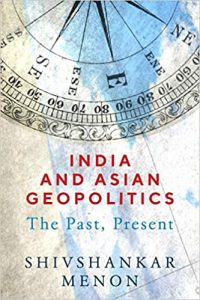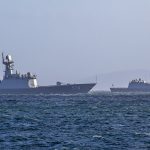
The uniqueness of India in aspects like geography, history and culture, positions the country as a major actor in Asia. The wise choices and policies according to the changing geopolitics particularly in Asia enabled India to actively engage in the world. The book ‘India and Asian Geopolitics: The Past, Present’ by Shivshankar Menon, a former National Security Advisor, Diplomat and Scholar, outlines the story of India and its quest since independence in a changing Asia. The book is divided into two parts where the first part with eight chapters traces the past events while the second part with five chapters paints the present, through a geopolitical lens.
The book begins with exploring the geography and topographical features of the Indian subcontinent which made it a major crossroad of Asia. The interconnectedness of the subcontinent within the region and the engagements with the rest of the world is explored chronologically. The author thus establishes the subcontinent as a ‘self-contained geopolitical unit’ which is the ‘pivot of the Indian Ocean’. He also brings forth how with the help of demography, resourcefulness and historical legacy, India’s behaviour and economy changed in the world.
The ideologies and visions of the leader influence the policies of a state and the author affirms this by referring to quotes from leaders like Nehru, K. M. Panikkar and Indira Gandhi. India’s independence and China’s revolution in 1949 altered engagements within Asia and Nehru saw Asia as a ‘potential political, economic and strategic space’. He knew that India’s foreign policy and domestic policies are linked and identified decolonisation, reshaping of subcontinental borders and Cold War as trends that would shape India. The book discusses the foreign policy of India under different regimes and narrates the responses of the country owing to geopolitical events in Asia.
The Cold War changed the geopolitical scenario in Asia. The bipolar world enabled India to be a key player in Korea and the author describes all the events that were influenced by Cold War. He sheds light on the solidification of partitions of India, Korea, Palestine etc through local wars and the intervention of the superpowers in issues that were not a direct threat to them. The author effectively details the bridging role of India, the Panchsheel Treaty and the India- China relations with a chronological correspondence to the Cuban Missile Crisis. The mid-1960s where the domestic politics in India entered a new trajectory with Shastri and Indira Gandhi’s rule along with events like the signing of the Tashkent Declaration, US engagement and Vietnam War, ASEAN, NPT etc are given special focus as a separate chapter followed by the story of Bangladesh, US-China rapprochement with Nixon’s visit to China and the geopolitics of West Asia from the 1973 oil crisis. The author details the situations in the neighbourhood like cases from Vietnam, Afghanistan, Sri Lanka, Nepal etc and provides an understanding of the opportunities of the post-Cold War world along with India’s policy during globalisation.
The second part of the book which accounts for the present situation starts with globalisation, its two-faced nature and its influence on Asian geopolitics. The author discusses how we are living in an ‘age of anxiety’ as globalisation enabled progress in the economy and living conditions but also created inequality and deprivation along with benefitting radical groups making the world less safe. Globalisation also caused the rise of China and its power projection inland as well as in the maritime domain. The author points out projects like Belt and Road Initiative by China through which China ‘develops economic, military and political leverage in its Asian periphery’. He relates the quick recovery of China from the COVID-19 pandemic to its accelerating economic order. He also illustrates how a multipolar world economy arises along with possible internal and external balancing that are evident due to globalisation.
According to the author, ‘Eurasia is being consolidated in the emerging Asian order’. The book provides a detailed narrative on the power politics in Asia with a special focus on China. The Asian continent is in transition and he views that ‘the key to Chinese political and military ambitions lies in Taiwan’ and in the country’s capability to defend its sea lanes of communication. He also opines that ‘we are witnessing a long-term paradigm shift in US-China relations where the tariff war is only one symptom’. Further, he describes the security situation and Indo-Pacific and enlists three possible geopolitical futures in Asia; a regional order centred on the US or China, a multipolar, open, inclusive concert of powers or a region of several powers with varying capabilities. However, he shares his view that neither China nor Asia is ready for a China centred order.
The East has the fastest-growing economies with rapid urbanisation and modern societies while the West are half-made societies with economies that depend on their natural resources. The book narrates views of East, West and Central Asia from India’s perspective as any situation in these regions would subsequently affect the security of the Indian subcontinent. The author explores the security cooperation between countries including scenarios like the US seeing India as a potential counterweight to China through QUAD, China involving itself in South Asia as a balancer, and India’s engagement with West Asia against radicalism. The rise of China and India-China relations is given special emphasis as far as Asia and India is concerned. With China projecting its soft and hard power along with ‘wolf warrior diplomacy’, the US-China relations will significantly affect Chinese behaviour. In such a scenario, the author agrees that India should expand its role as a security provider in the maritime sector too. He suggests a fresh outlook towards Indian foreign policy and its theoretical foundations by incorporating intellectual, practical policies and workable grand strategies for India in Asia with multiple likely futures.
The book concludes with an afterword in which the author writes about India’s destiny. He states that India should ensure a safe, prosperous and dignified life to every Indian with an opportunity to realise their potential as the citizens are the future of the country. He recommends harmonious cooperation among major powers and requires India to get to its roots. Further, he views that the ‘narrow, intolerant and diminishing vision born from fear and polarisation should be negated to focus on rededicating to the vision of national self-confidence and ambition which is progressive that respects all citizens and has a universal appeal’.
In the current geopolitical scenario, Asia is central to world security and prosperity with territorial claims, rising power, naval build-ups along with increased contestation in maritime space. This shows rapid and possible power shifts in the world. This book is thus timely and insightful and gives a clear understanding on the geopolitical structure of Asia from the past till the present day. The author says that history is a map and successfully provides a structured chronological map of the transforming Indian foreign policy with special emphasis on its neighbourhood from an Indian perspective. The book also puts forward the consequences and challenges with thought-provoking suggestions for policy-making. The author’s experience and reach over the geopolitical events makes the book worth a read for anyone interested in geopolitics and Indian Foreign policy in the world order.















